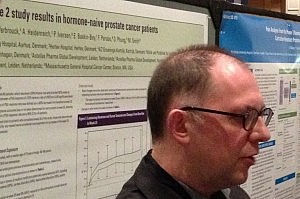ASCO GU 2014: Will there be a market for Medivation’s enzalutamide in M0 prostate cancer?
Since 2004, six new prostate cancer treatments have been approved for advanced prostate cancer: docetaxel (Taxotere), sipuleucel-T (Provenge), cabazitaxel (Jevtana), abiraterone (Zytiga), enzalutamide (Xtandi), radium-223 (Xofigo).
In the process, the competitive landscape has been radically transformed.
What we have seen more recently with the PREVAIL and COU-AA-302 data is a move to treat mildly symptomatic men earlier in metastatic disease prior to chemotherapy, thereby delaying disease progression, and in the case of enzalutamide, improving overall survival.
But how early can you go?
The focus of several companies looking to bring new prostate cancer drugs to market is now shifting from symptomatic metastatic castrate resistant prostate cancer (mCRPC) to earlier in the disease setting, i.e. asymptomatic M0 disease.
There are number of critical questions that need addressing, including:
- Should we treat men with metastatic (M0) castration-resistant prostate cancer (CRPC) who are asymptomatic?
- Will the treatments be able to demonstrate that taking them means men will live longer and feel better?
- Will there be a market for AR antagonists such as enzalutamide, ODM-201, and ARN-509 in M0 prostate cancer, where large randomised phase 3 trials are either underway or are planned?

Prof Tombal at ASCO GU 2013
During ASCO GU, I asked one of the leading thought leaders and researchers into this area for his candid perspective.
To learn more about our latest insights, subscribers can log-in or you can purchase access to BSB Premium Content.
This content is restricted to subscribers